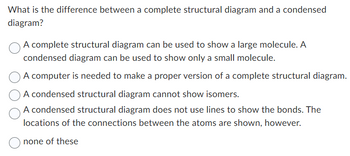
Chemistry
10th Edition
ISBN: 9781305957404
Author: Steven S. Zumdahl, Susan A. Zumdahl, Donald J. DeCoste
Publisher: Cengage Learning
expand_more
expand_more
format_list_bulleted
Question
12

Transcribed Image Text:What is the difference between a complete structural diagram and a condensed
diagram?
A complete structural diagram can be used to show a large molecule. A
condensed diagram can be used to show only a small molecule.
A computer is needed to make a proper version of a complete structural diagram.
A condensed structural diagram cannot show isomers.
A condensed structural diagram does not use lines to show the bonds. The
locations of the connections between the atoms are shown, however.
none of these
Expert Solution
This question has been solved!
Explore an expertly crafted, step-by-step solution for a thorough understanding of key concepts.
Step by stepSolved in 3 steps

Knowledge Booster
Learn more about
Need a deep-dive on the concept behind this application? Look no further. Learn more about this topic, chemistry and related others by exploring similar questions and additional content below.Similar questions
- ? 1. 03-78°C 2. (CH3)₂S + byl H i H Harrow_forwardis this right?arrow_forwardRx Paregoric 15.0 mL Pectin 0.5 g Kaolin 20.0 g Ethanol 1.0 mL Purified water ad 100.0 mL Mix and make a suspension Sig. 15 mL p.r.n. for diarrhea How many milligrams of kaolin are contained in each dose? Amount of kaolin in each dose = mgarrow_forward
- how do i find the freezing point of this graph?arrow_forwardP = P2O5 × 0.44 P2O5 = P × 2.29 K = K2O × 0.83 K2O = K × 1.21 1 tonne = 1,000 kg 1 ha = 10,000 m2 Using the conversions above calculate : 1.How much N and K are in a 25 kg bag of 12-22-18? 2. How much P2O5 and P are in a 20 kg bag of 0-46-0? 3. How much K2O and P2O5 are in a 35 kg bag of 12-22-18?arrow_forwardWhat's 12,13 and 16?arrow_forward
- What is the following and what are the organic molecules? H H H H H C C (3 lines) C C C C H H H H Harrow_forwardOrganisms can live on Earth because of Earth's location in the solar system. How does Earth's distance from the Sun MOST affect Earth's water and enable life to exist? O A. It makes it possible to have water as a liquid over more than 70% of the planet. O B. It allows water to freeze OC. It changes water's specific gravity O D. It allows water to be salty or fresh DELL F10 F7 F2 F3 F4 & 6. 8.arrow_forwardPART I: For each of the following Chemical Word Equations, perform the following: a) Write out the formula equation b) Balance the Equation c) Give the Sum of the Coefficients d) Tell what Type of Chemical Reaction it isarrow_forward
arrow_back_ios
SEE MORE QUESTIONS
arrow_forward_ios
Recommended textbooks for you
 ChemistryChemistryISBN:9781305957404Author:Steven S. Zumdahl, Susan A. Zumdahl, Donald J. DeCostePublisher:Cengage Learning
ChemistryChemistryISBN:9781305957404Author:Steven S. Zumdahl, Susan A. Zumdahl, Donald J. DeCostePublisher:Cengage Learning ChemistryChemistryISBN:9781259911156Author:Raymond Chang Dr., Jason Overby ProfessorPublisher:McGraw-Hill Education
ChemistryChemistryISBN:9781259911156Author:Raymond Chang Dr., Jason Overby ProfessorPublisher:McGraw-Hill Education Principles of Instrumental AnalysisChemistryISBN:9781305577213Author:Douglas A. Skoog, F. James Holler, Stanley R. CrouchPublisher:Cengage Learning
Principles of Instrumental AnalysisChemistryISBN:9781305577213Author:Douglas A. Skoog, F. James Holler, Stanley R. CrouchPublisher:Cengage Learning Organic ChemistryChemistryISBN:9780078021558Author:Janice Gorzynski Smith Dr.Publisher:McGraw-Hill Education
Organic ChemistryChemistryISBN:9780078021558Author:Janice Gorzynski Smith Dr.Publisher:McGraw-Hill Education Chemistry: Principles and ReactionsChemistryISBN:9781305079373Author:William L. Masterton, Cecile N. HurleyPublisher:Cengage Learning
Chemistry: Principles and ReactionsChemistryISBN:9781305079373Author:William L. Masterton, Cecile N. HurleyPublisher:Cengage Learning Elementary Principles of Chemical Processes, Bind...ChemistryISBN:9781118431221Author:Richard M. Felder, Ronald W. Rousseau, Lisa G. BullardPublisher:WILEY
Elementary Principles of Chemical Processes, Bind...ChemistryISBN:9781118431221Author:Richard M. Felder, Ronald W. Rousseau, Lisa G. BullardPublisher:WILEY

Chemistry
Chemistry
ISBN:9781305957404
Author:Steven S. Zumdahl, Susan A. Zumdahl, Donald J. DeCoste
Publisher:Cengage Learning

Chemistry
Chemistry
ISBN:9781259911156
Author:Raymond Chang Dr., Jason Overby Professor
Publisher:McGraw-Hill Education

Principles of Instrumental Analysis
Chemistry
ISBN:9781305577213
Author:Douglas A. Skoog, F. James Holler, Stanley R. Crouch
Publisher:Cengage Learning

Organic Chemistry
Chemistry
ISBN:9780078021558
Author:Janice Gorzynski Smith Dr.
Publisher:McGraw-Hill Education

Chemistry: Principles and Reactions
Chemistry
ISBN:9781305079373
Author:William L. Masterton, Cecile N. Hurley
Publisher:Cengage Learning

Elementary Principles of Chemical Processes, Bind...
Chemistry
ISBN:9781118431221
Author:Richard M. Felder, Ronald W. Rousseau, Lisa G. Bullard
Publisher:WILEY